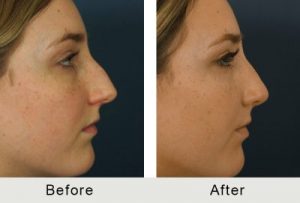 When it comes to taking the final step toward getting a rhinoplasty, there are numerous factors to consider. While the eyes may be considered the windows to the soul, the nose provides facial symmetry and balance. It complements the rest of the face and adds to one’s overall attractiveness. In order to get the results you want from a rhinoplasty procedure in North Carolina, whether cosmetic or medical, it’s crucial to consider the following.
When it comes to taking the final step toward getting a rhinoplasty, there are numerous factors to consider. While the eyes may be considered the windows to the soul, the nose provides facial symmetry and balance. It complements the rest of the face and adds to one’s overall attractiveness. In order to get the results you want from a rhinoplasty procedure in North Carolina, whether cosmetic or medical, it’s crucial to consider the following.
At Carolina Facial Plastics, Charlotte facial plastic surgeon Dr. Jonathan Kulbersh and staff understand the importance of facial balance and symmetry. They also know that undergoing a procedure such as a rhinoplasty is a potentially life-changing decision. As such, if you’re considering it, you should get answers to the following questions from your rhinoplasty surgeon to ensure you get the best possible results.
Questions to Ask Your Rhinoplasty Surgeon
1. Are You Board-Certified?
Facial plastic surgery requires special training beyond general plastic surgery, and the procedures and techniques necessary for rhinoplasty require unsurpassed training and continued learning. A rhinoplasty can be complicated. For example, facial plastics surgeons typically become an ear, nose, and throat (ENT) surgeon, or otolaryngologist, before moving on to a facial plastics fellowship. This specialized training is crucial for safely and successfully operating on the complex internal and external structures of the nose. Therefore, make sure your surgeon has been certified by the American Academy of Facial Plastic and Reconstructive Surgery (AAFPRS) as well as the American Board of Otolaryngology – Head and Neck Surgery (ABOto).
2. What Is Your Rhinoplasty Experience?
In addition to training and certification, your nose surgeon should be experienced. Of course, everyone has to start somewhere, even doctors, but when undergoing such a delicate procedure, it’s best to trust your results and safety to a facial plastic surgeon whose training and skill have been honed by years of experience.
Don’t hesitate to ask your surgeon about his or her experience. Ask about the number of years your doctor has been performing rhinoplasty procedures as well as the number of procedures that he or she has performed.
3. Can I See Before/After Photos?
Ask to see a variety of before-and-after images to see the range of past results and effects from your doctor’s treatments. It can also give you an idea of what you can expect from you own rhinoplasty procedure.

4. How Long Will the Procedure Last?
Usually, a rhinoplasty performed by Dr. Kulbersh typically takes around 2 to 4 hours depending on the complexity. A rhinoplasty is should be meticulous, efficient, but never fast or rushing. A revision rhinoplasty may take longer secondary to scarring from the previous surgery or increased complexity. It’s a good idea to ask your surgeon so you can schedule the time off appropriately for your busy life.
5. What Is Your Revision Policy and Rate?
The revision rate for all rhinoplasty surgeries in the United States run around 10%. For this reason, it’s crucial that you choose your surgeon wisely and that have clear communication about your goals for the surgery. I believe imaging morphing is the best method to communicate the goals of the surgery. Still, find out what your surgeon’s policy on revisions is as well as the revision rhinoplasty rate. At Carolina Facial Plastics, the revision rate is well below the national average.
Of course, a revision surgery could be necessary for a variety of reasons, some of which are not due to the surgeon or the procedure itself, but secondary to the unpredictable healing of the nose.
6. What Potential Complications Are There?
It’s important to be prepared for possible complications or side effects, such as how long swelling should last or how to deal with excessive bleeding. You may also want to know how you can protect against infection during your recovery and what to do if side effects don’t subside in due time.
7. Which Type of Technique Will I Undergo?
Will you undergo an open or closed nose surgery procedure? The technique depends on your goals for surgery, the part(s) of your nose to be improved, and the level of difficulty the procedure requires.
An open rhinoplasty peels the skin of your nose back to expose the inside of the nose while a closed nose surgery is performed from inside the cavity without pulling the skin back. Generally speaking, I prefer the open techniques as the visualization is superior.
Learn more about rhinoplasty procedures at WebMD.com.
8. How Long Will the Swelling Last?
Not all rhinoplasty recovery is the same as everyone heals at a different rate, but typically, you should expect a significant reduction in swelling and bruising within two weeks and nearly 75 percent decrease after about at 4 months. The nose will continue to improve for up to a year as the swelling subsides over this time. For revision rhinoplasty, the swelling will resolve slower.
9. When Can the Final Results Be Expected?
About a month after your Charlotte rhinoplasty, you and your doctor should have a fairly good idea of how the final results will look, which likely won’t be fully evident for about a year.
10. When Can I Get Back to Normal Exercise and Physical Activity?
During your rhinoplasty recovery, you’ll wear a splint for the first 7 days, which will restrict your physical activity. Once the bandage is removed, the swelling may still make breathing difficult during the first few weeks, however, you can resume mild physical activity, such as walking. The nasal bones can take up to six weeks to heal and moderate exercise and contact sports should be limited until the surgical site has healed as much as possible. Dr. Kulbersh and his staff are more than happy to consult with patients throughout the recovery to ensure the safest return to everyday life and activities.
11. What is the Cost of a Rhinoplasty Procedure?
The cost of nose surgery depends on many factors, including the complexity of the procedure, location, and experience/specialization of the surgeon. Talk to your provider as well as your surgeon to learn your specific costs.
For Other Questions about Nose Surgery, Contact Carolina Facial Plastics
The decision to undergo a rhinoplasty procedure should be taken seriously. To get more information about what to expect before and after a rhinoplasty, don’t hesitate to schedule a consultation with Dr. Kulbersh at Carolina Facial Plastics. Contact us online or call our office in Charlotte at 704.842.3644.
Next, read Looking for Great Cheekbones? This Procedure Could Be Right for You
The post Top 11 Questions to Ask Your Rhinoplasty Surgeon appeared first on Carolina Facial Plastics.
No comments:
Post a Comment